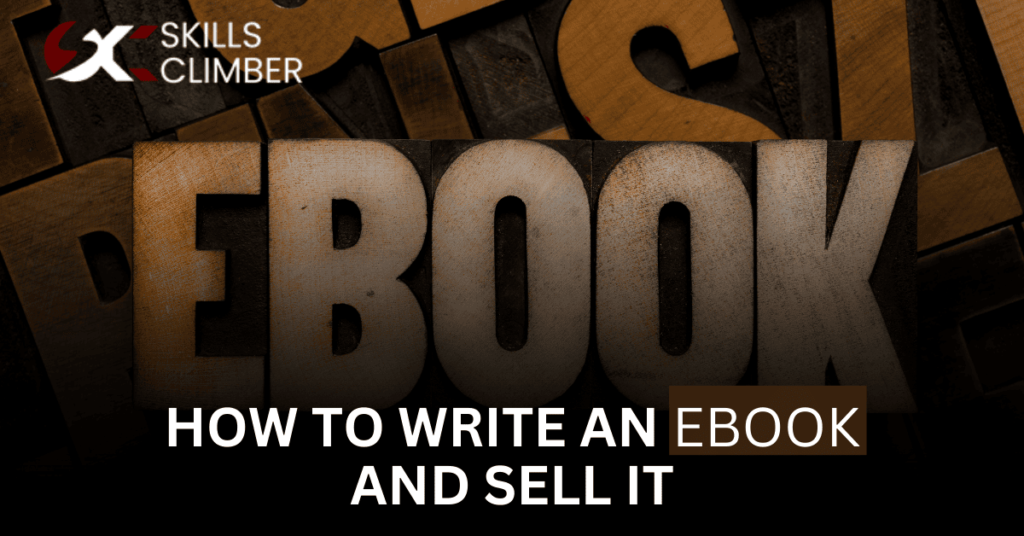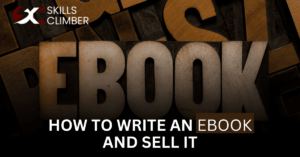Team Skills Climber
In 2025, ebooks continue to reign as a lucrative way to earn passive income. Their accessibility, minimal upfront costs, and scalability are probably making them an amazing choice for aspiring authors and entrepreneurs alike.
This guide walks you through the process—from planning to marketing—to help you how to write an ebook and sell it in 2025 to generate impressive income. Let’s dive in!

Table of Contents
Why Ebooks Are Still Profitable in 2025
Digital content consumption is at an all-time high, with people turning to ebooks for learning, entertainment, and skill-building. According to Market.us, the global eBook market is projected to reach $29.9 billion by 2033. Statista reports that eBooks market is expected to reach approximately USD 14.92 billion by 2025. Compared to traditional publishing, ebooks may offer higher profit margins and faster turnarounds.
The Potential for Passive Income Through Ebooks
Once you’ve created an ebook, it becomes a digital asset that can generate income repeatedly with little ongoing effort. It is just like planting a tree: with proper care during the initial stages, it may bear fruit for years.
How to Write an Ebook and Sell It
This guide will cover how to write an ebook and sell it, from choosing a profitable niche to marketing and scaling your ebook business. Whether you’re a beginner or a seasoned creator, there’s probably something for everyone.
Part 1: Planning Your Ebook
1. Identify Your Niche and Target Audience
What Makes a Niche Profitable?
A profitable niche solves a problem or fulfills a strong desire. Examples include personal finance, self-improvement, and niche hobbies like urban gardening.
For instance: For meal planning, create an ebook titled “30-Day Meal Plans for Busy Professionals”. By targeting a specific query, chances of success may increase.
Researching Reader Pain Points and Desires
Use tools like Reddit, Quora, or Facebook groups to comprehend your audience’s questions and frustrations. Create content that directly addresses these issues.
We have covered 15 best-selling ebook topics for 2025. Check it out now!
2. Selecting a Winning Topic
Selecting a winning topic is important for authors with the aim to thrive in the competitive self-publishing arena. The right topic attracts readers and improves your eBook’s marketability and revenue potential.
Tools for Topic Research
- Google Trends: Discover trending topics.
- AnswerThePublic: Uncover common questions.
- Keyword Research Tools: Identify terms with high search volume but low competition. For Instance: Ahrefs, Semrush, etc
Step-by-Step Example:
- Choose a high density keyword, e.g., “Freelance Writing.”
- Use Google Trends or other keyword research tools to check its popularity.
- Narrow down to a topic like “How to Start Freelance Writing with Zero Experience.”
How to Validate Your Topic
Survey your audience or check the performance of similar ebooks in your niche. A simple poll can reveal what readers want.
3. Setting Goals for Your Ebook
Income Goals: Realistic Expectations
Set a target—whether it’s $1,000 a month or $10,000 a year. Act according to this goal to decide on pricing and sales strategies.
Brand Building and Lead Generation Goals
Ebooks aren’t just about money. They can establish your expertise and serve as lead magnets for your other products or services.
4. Crafting a Clear Value Proposition
Answering “Why Should Readers Buy This Ebook?”
Define the unique benefits your ebook offers. For example, “Learn how to save $10,000 in a year with practical, actionable tips.”
Communicating Benefits Over Features
Focus on the results readers will achieve, not just the content itself.
Part 2: Writing Your Ebook
5. Structuring Your Ebook
Outlining: The MECE Framework in Action
Ensure your ebook is Mutually Exclusive, Collectively Exhaustive. This means covering all necessary points without overlap.
Chapter-by-Chapter Breakdown
Each chapter should build on the previous one, taking readers on a smooth logical journey.
6. Writing for Your Audience
Adopting the Right Tone and Style
Write as if you’re chatting with a friend. Avoid jargon unless your audience expects it.
Tips for Clear and Concise Writing
- Use short sentences.
- Break up long paragraphs.
- Use examples and metaphors to clarify complex ideas.
Pro tip: For a conversational tone, imagine explaining your content to a curious friend over coffee.
7. Tools and Software to Simplify Writing
Free vs. Paid Writing Tools
- Free: Google Docs, Grammarly (basic).
- Paid: Scrivener, ProWritingAid.
AI Assistance for Better Drafting
Use tools like ChatGPT to brainstorm ideas or improve drafts.
8. Ensuring High-Quality Content
Incorporating Data, Examples, and Case Studies
Concrete examples and stats can make your ebook more credible and engaging.
Avoiding Fluff and Maintaining Reader Engagement
Every sentence should provide value. If it doesn’t, cut it out.
9. Designing a Visually Appealing Ebook
Tools for Ebook Design
- Canva: User-friendly for beginners.
- Adobe InDesign: Professional-grade design.
Importance of Readability and Formatting
Stick to clear fonts, ample spacing, and a clean layout to enhance the reading experience.
Sample Structure:
- Introduction – Define the problem.
- Key Chapters – Provide actionable steps.
- Conclusion – Recap and inspire action.
Part 3: Publishing Your Ebook
10. Choosing the Right Platform for Publication
Self-Publishing Options
- Amazon Kindle: The largest marketplace.
- Gumroad: Ideal for independent creators.
- Personal Website: Ideal for keeping more profit and independence.
If you wanna know how to sell ebooks on your own website like a pro. Check out this guide!
Comparing Features and Fees
Consider platform fees, audience reach, restrictions, tracking analytics, and ease of use when choosing where to publish.
11. Setting the Right Price
Pricing Strategies for Maximum Profit
- Value-Based Pricing: Price based on the benefits your ebook offers.
- Competitive Pricing: Look at similar ebooks in your niche.
Testing and Adjusting Price Points
Test with different prices to see what aligns with your audience.
12. Crafting a Captivating Cover and Title
Why First Impressions Matter
A poorly designed cover can kill sales. Invest time and effort here. Design it yourself or hire a freelancer.
Tools for Creating Professional Covers
Canva and Adobe Express are great starting points.
13. Writing a Compelling Description
Leveraging Copywriting Techniques
Use attention-grabbing hooks or power words and highlight benefits.
Highlighting Benefits and Value
Explain how your ebook will transform the reader’s life.
Part 4: Marketing and Selling Your Ebook
14. Building a Pre-Launch Audience
Using Social Media, Email Lists, and Communities
Create anticipation with sneak peeks and early-bird discounts.
Creating a Buzz with Free Previews
Offer a free chapter to generate interest.
15. Launching Your Ebook Effectively
Timing and Coordination for Maximum Impact
Plan your launch around peak traffic times for your audience.
Leveraging Paid Ads and Influencers
Small investments in Facebook ads or influencer collaborations can pay off big.
16. Leveraging Content Marketing
Writing Blog Posts and Guest Articles to Promote Your Ebook
Repurpose sections of your ebook into blogs or articles. This can generate authority as well as sales.
Using SEO to Drive Organic Traffic
Optimize your website (if you have one) and blogs (or guest posts) for keywords related to your ebook.
17. Expanding Your Reach Through Partnerships
Collaborating with Affiliates and Influencers
Offer commissions to affiliates to boost sales.
Cross-promotions with Complementary Creators
Partner with creators in related niches for mutual benefit.
18. Analyzing Sales and Feedback
Using Analytics to Measure Performance
Track sales data to see what’s working. If you can’t measure it, you can’t improve it.
Responding to Reader Reviews and Improving Future Editions
Utilize feedback to refine your ebook and future offerings.
Part 5: Scaling and Beyond
19. Creating a Series or Follow-Up Ebooks
Building a Brand Around Your Content
Consistency in style and quality builds trust with readers.
Strategies for Expanding Your Ebook Portfolio
Diversify topics while staying within your niche.
20. Repurposing Your Ebook Content
Turning Your Ebook Into Courses, Webinars, or Audiobooks
Reach different audiences by repurposing content into new formats.
Conclusion
Writing and selling an ebook in 2025 is a golden opportunity for those willing to put in the effort. But before that, having a clear roadmap and learning how to write an ebook and sell it is important. By following this step-by-step guide about how to write an ebook and sell it, you may be in a better way to creating a valuable product that resonates with readers and generates significant income.
Take the first step today and start planning your ebook!
Learn about the side hustle opportunities for teachers, teens, and nurses now!
[sp_easyaccordion id=”4211″]
Follow Skills Climber for more!





